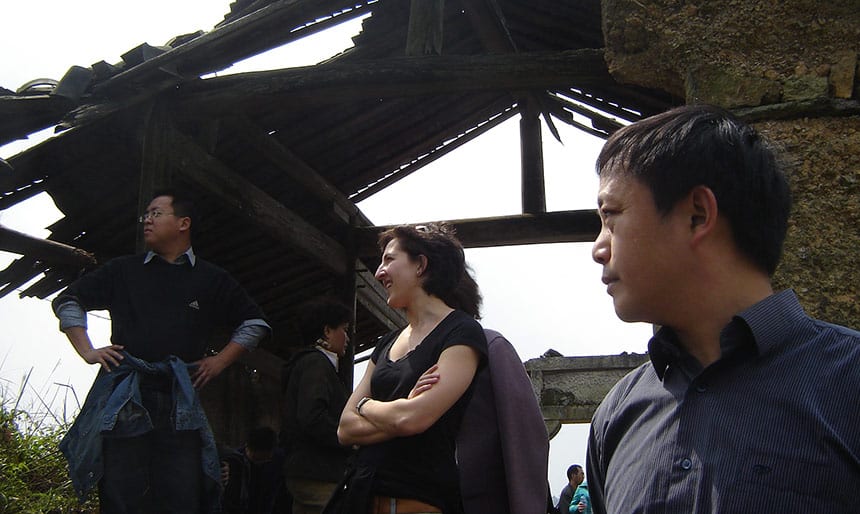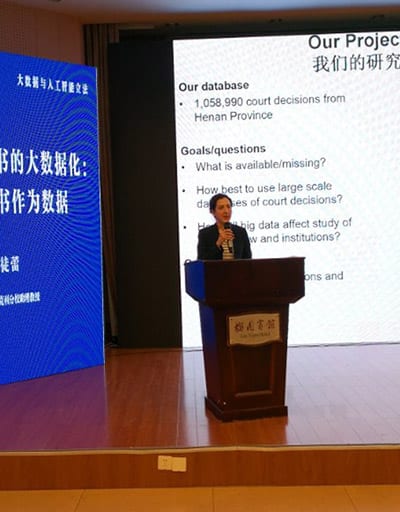
By Andrew Cohen
Every time Rachel Stern is in China, from her first job after college at an environmental think tank to her most recent trip, “it feels like I’m in the center of the universe. The rise of China is the political story of our lifetime, with huge ripple effects in the United States and across the world.”
That ascension is powerful fuel for a fast-rising scholar whose research has vaulted her to the forefront of studying China’s legal system. Her latest honor: a Hellman Award, which supports the research of promising UC Berkeley junior faculty “who show capacity for great distinction.” An assistant professor of law and political science, Stern received funding to illuminate how judicial transparency in China is changing that nation’s practice of law.
On January 1, 2014, China initiated a major policy change. Its legal decisions—previously available only to the lawyers and parties involved—now must all be published online. Stern, along with Columbia Law School Professor Benjamin Liebman and UC San Diego Political Science Professor Margaret Roberts, have since immersed themselves in the herculean challenge of analyzing reams of legal decisions.
Liebman, who directs Columbia’s Center for Chinese Legal Studies, said, “Rachel’s work has been critically important in illuminating how law works, and sometimes does not work, in everyday practice. She has a deep understanding of what goes on at the local level. She’s also at the forefront in combining qualitative on-the-ground research with the emerging field of big data and law in China.”

Not long ago, Stern focused on unearthing elusive judicial opinions to find possible trends. Now, the Supreme People’s Court website boasts of hosting the largest collection of public cases in the world.
“The traditional view of Chinese court rulings is that they’re not interesting, too short, and all that matters in the case occurred behind the scenes without being written down,” Stern said. “I’d written an article based on 50 court decisions showing how judges were thinking about the law. At the time, it felt like a coup to get access to that many, and now we’re trying to analyze 29 million.”
Big task, big data
Stern, Liebman, and Roberts use sophisticated programs to organize and make sense of Chinese judicial trends. One is called “topic modeling,” in which an algorithm analyzes words often seen together within the text. It helps identify subjects that surface frequently in various areas of law.
“There’s no substitute for actually reading the cases, but when you have a corpus so vast you need tools like this to parse the text and organize cases for analysis,” Stern said. “This is a massive undertaking, and a very exciting one. We don’t know what everyday law looks like in the world’s largest country, but soon we will.”
Some major findings have already emerged. Intent on efficiency—China’s courts clear their dockets every year, in stark contrast to the U.S. and most other western countries—China has begun implementing automated software to help produce case decisions. As the courts become busier, caused in part by judges increasingly leaving their positions for higher-paying jobs in private practice, reliance on automation will likely increase.
Stern said this also reflects a broader push for transparency under Chinese President Xi Jinping’s administration. “It’s a way to push back against corruption in the court system because judges now know their decisions will appear online,” she explained. “The courts themselves like this automated software because they’re busy and overworked, and it allows individual judges to avoid taking responsibility for difficult cases.”
For Liebman, who believes “it’s vitally important to understand the role of law—and of lawyers—in the Chinese system,” Stern is a key figure in achieving that insight. “Rachel is a leading scholar when it comes to bringing to light unknown trends in Chinese law, and at explaining why they matter to lawyers and scholars everywhere,” he said.
Digging in
Seeking to understand the origins and consequences of China’s sudden public embrace of judicial transparency, Stern also studies how that functions in an authoritarian regime. Her research team is beginning to interview scholars, judges, lawyers, and employees at companies that market legal information to shed light on the politics driving this dramatic policy shift.
While algorithms and automated judging have sparked notable concern in the United States, Stern sees the opposite happening in China.

“There’s a general tech-optimism in China that contrasts sharply with the U.S., where we’re more ambivalent about technology’s impact,” she said. “It also points to the history and political culture of each country. In the U.S., we have real concerns about how algorithms fail to account for racial bias in our justice system. That history and political conversation about race is not evident in China.”
In researching how this new transparency changes the way judges and lawyers do their jobs, Stern sees a steady development of “soft precedent.” Although China’s civil law system does not formally invoke case precedent, lawyers are increasingly searching online for winning arguments from cases similar to their own.
“The emergence of soft precedent is in no way binding,” she said. “But in a court system where judges are busy and overworked, you see how it could take off.”
A broader view
With surging globalization, understanding Chinese legal processes is vital for American lawyers—especially as they tackle cases that are increasingly transnational. Stern was recently asked to work on a case in which a party wanted to use the U.S. discovery process to force a Chinese company to release documents. Under U.S. law, such content would be protected under attorney-client privilege.
“We think our way of doing things is normal and inevitable, but the American system is an outlier in many ways,” Stern said. “In other civil law systems, people think it’s insane that we have juries—filled with people who know nothing about law—making key decisions. Another example is how difficult it is to alter the Constitution. Worldwide, the average constitution lasts about 20 years.”
A non-resident senior fellow at The Brookings Institution, Stern authored the book Environmental Litigation in China: A Study in Political Ambivalence in 2013. She has also written numerous papers and articles on pivotal legal issues in China, including the country’s bar exam, how international law firms approach its legal market, and the political logic behind its environmental courts.
Despite the enormity of her current endeavor, Stern remains unbowed in her effort to find meaningful research treasures—and to keep up with China’s dizzying pace.
“If you live in Berkeley and go away for six months, when you come back you don’t notice much change,” she said. “If you live in Beijing and do the same thing, it feels like six years have passed. You see huge public works projects that didn’t exist, stores that have opened and closed since you left, and all kinds of other changes. Law provides a lens to see what’s driving these changes, and now it leaves a huge paper trail—an amazing window into things that might otherwise be hard to see.”